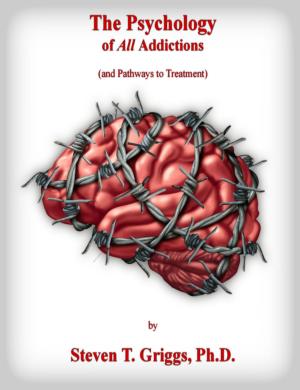Anger Management, Types I and II
Nonfiction, Health & Well Being, Psychology, Cognitive Psychology, Self Help, Self Improvement| Author: | Steven T. Griggs, Ph.D. | ISBN: | 9781465885630 |
| Publisher: | Steven T. Griggs, Ph.D. | Publication: | January 22, 2012 |
| Imprint: | Smashwords Edition | Language: | English |
| Author: | Steven T. Griggs, Ph.D. |
| ISBN: | 9781465885630 |
| Publisher: | Steven T. Griggs, Ph.D. |
| Publication: | January 22, 2012 |
| Imprint: | Smashwords Edition |
| Language: | English |
Anger management is a skill that everyone needs and uses to some degree, in just about every situation. This 45 page ebook covers anger management in depth, just like I do in the office. I take you through, step-by-step, how to diagnose your anger, classify it and manage it.
It turns out anger management can be taught to almost everyone. I’ve taught it to children, not just adults. I’ve taught anger techniques to schizophrenics and to people with out-of-control mood disorders. Anyone can learn about this subject and anyone can learn to manage their anger.
You may be having trouble in your relationship, or blowing up at work. You may be referred by the courts, which happens if your anger leads to excessive drinking or fighting, custody issues, etc..
Anger has to do with being out of control of reactions, or about being out of touch with feelings. Type I anger people "lose it" and act out. Type II anger people lose it and "act in." Type I anger people explode, while Type II anger people implode. There are characteristics and symptoms of each, which I list and explore. Type II anger is new to the literature. You won't find this described anywhere else, because its my original concept.
People have a long list of reasons not to control their anger, which is addressed. There are lots of popular or other internet sources for anger management techniques. I list them. These work, sort of, and if they work for you--good. Your anger problem is not that serious. But there are deeper, psychological approaches that fix, not mollify the problem. To effectively manage anger or either Type I or Type II, one has to get to the "deep stuff."
Most of the pop-psychology books are too long. I’ve boiled down the concepts in this ebook into clear, manageable steps. I’ve made this as easy to understand as is humanly possible, combining what I’ve read with what I’ve learned from clients. Plus, there is a discussion on the newest ways to conceptualize anger mismanagement, relative not just to psychology, but to cognitive behavioral techniques and mindfulness.
Anger management is a skill that everyone needs and uses to some degree, in just about every situation. This 45 page ebook covers anger management in depth, just like I do in the office. I take you through, step-by-step, how to diagnose your anger, classify it and manage it.
It turns out anger management can be taught to almost everyone. I’ve taught it to children, not just adults. I’ve taught anger techniques to schizophrenics and to people with out-of-control mood disorders. Anyone can learn about this subject and anyone can learn to manage their anger.
You may be having trouble in your relationship, or blowing up at work. You may be referred by the courts, which happens if your anger leads to excessive drinking or fighting, custody issues, etc..
Anger has to do with being out of control of reactions, or about being out of touch with feelings. Type I anger people "lose it" and act out. Type II anger people lose it and "act in." Type I anger people explode, while Type II anger people implode. There are characteristics and symptoms of each, which I list and explore. Type II anger is new to the literature. You won't find this described anywhere else, because its my original concept.
People have a long list of reasons not to control their anger, which is addressed. There are lots of popular or other internet sources for anger management techniques. I list them. These work, sort of, and if they work for you--good. Your anger problem is not that serious. But there are deeper, psychological approaches that fix, not mollify the problem. To effectively manage anger or either Type I or Type II, one has to get to the "deep stuff."
Most of the pop-psychology books are too long. I’ve boiled down the concepts in this ebook into clear, manageable steps. I’ve made this as easy to understand as is humanly possible, combining what I’ve read with what I’ve learned from clients. Plus, there is a discussion on the newest ways to conceptualize anger mismanagement, relative not just to psychology, but to cognitive behavioral techniques and mindfulness.















